English irregular verbs
English irregular verbs 英语不规则动词表
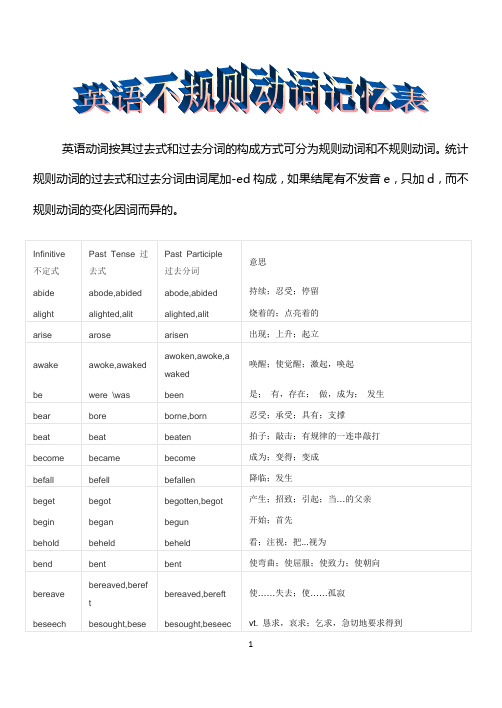
beat beat beaten 打[ ] [ ] [ ]⒊A---B---A型(现在式和过去分词同形)come came come 来[ ] [ ] [ ]become became become 变[ ] [ ] [ ]run ran run 跑[ ] [ ] [ ]⒋A ---B ---B型⑴在动词原形后加一个辅音字母d或t构成过去式或过去分词。
burn burnt burnt 燃烧learn learned/learnt learned/learnt 学习mean meant meant 意思hear heard heard 听见⑵把动词原形的最后一个辅音字母“d”改为“t”构成过去式或过去分词。
build built built 建筑lend lent lent 借给lose lost lost 失去send sent sent 送spend spent spent 花费⑶其他pay paid paid 付lay laid laid 下蛋say said said 说bring brought brought 带来buy bought bought 买think thought thought 想catch caught caught 抓住teach taught taught 教fight fought fought 战斗sleep slept slept 睡keep kept kept 保持sweep swept swept 扫stand stood stood 站understand understood understood 明白win won won 得胜shine shone/shined shone/shined 发光feel felt felt 觉得find found found 发现get got got 得到hang hanged hanged 绞死hang hung hung 挂have had had 有hold held held 盛,握leave left left 离开make made made 制造meet met met 遇见sell sold sold 卖shoot shot shot 射击tell told told 告诉smell smelt/smelled smelt/smelled 嗅,闻sit sat sat 坐dig dug dug 挖⒌A---B---C型(现在式、过去式和过去分词都不相同)⑴在动词原形后加-n或-en构成过去分词。
部编人教版八年级上册英语Irregular Verbs(不规则动词表)
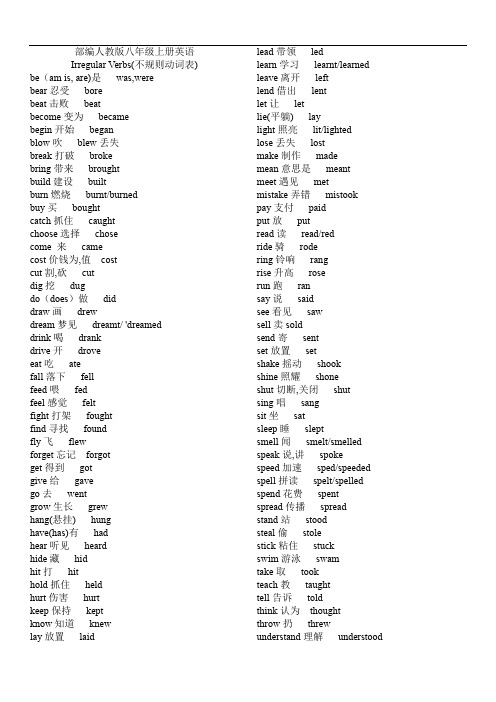
部编人教版八年级上册英语Irregular Verbs(不规则动词表) be(am is, are)是was,werebear忍受borebeat击败beatbecome变为becamebegin开始beganblow吹blew丢失break打破brokebring带来broughtbuild建设builtburn燃烧burnt/burnedbuy买boughtcatch抓住caughtchoose选择chosecome 来camecost价钱为,值costcut割,砍cutdig挖dugdo(does)做diddraw画drewdream梦见dreamt/ 'dreameddrink喝drankdrive开droveeat吃atefall落下fellfeed喂fedfeel感觉feltfight打架foughtfind寻找foundfly飞flewforget忘记forgotget得到gotgive给gavego去wentgrow生长grewhang(悬挂) hunghave(has)有hadhear听见heardhide藏hidhit打hithold抓住heldhurt伤害hurtkeep保持keptknow知道knewlay放置laid lead带领ledlearn学习learnt/learned leave离开leftlend借出lentlet让letlie(平躺) laylight照亮lit/lightedlose丢失lostmake制作mademean意思是meantmeet遇见metmistake弄错mistookpay支付paidput放putread读read/redride骑rodering铃响rangrise升高roserun跑ransay说saidsee看见sawsell卖soldsend寄sentset放置setshake摇动shookshine照耀shoneshut切断,关闭shutsing唱sangsit坐satsleep睡sleptsmell闻smelt/smelled speak说,讲spokespeed加速sped/speeded spell拼读spelt/spelled spend花费spentspread传播spreadstand站stoodsteal偷stolestick粘住stuckswim游泳swamtake取tookteach教taughttell告诉toldthink认为thoughtthrow扔threw understand理解understoodwake醒woke wear穿wore win赢won write写wrote。
英语过去式总结

英语过去式总结The Past Tense in EnglishThe past tense is a grammatical tense used to describe actions or states that have already happened in the past. In English, there are several ways to express the past tense, and understanding how to use them correctly is essential for effective communication. This article will provide a comprehensive summary of the past tense in English.1. Regular verbs:Regular verbs form the past tense by adding "-ed" to the base form of the verb. For example:- Walk (base form) → W alked (past tense)- Play (base form) → Played (past tense)Exceptions to this rule include verbs that end in "-e," which only require adding "-d" to form the past tense:- Love (base form) → Loved (past tense)2. Irregular verbs:Irregular verbs do not follow a predictable pattern when forming the past tense. They often change their spelling completely. Some common examples of irregular verbs and their past tense forms include:- Go (base form) → Went (past tense)- Have (base form) → Had (past tense)- B uy (base form) → Bought (past tense)3. Verbs ending in "-y":Verbs that end in "-y" and have a consonant before it change the"y" to "i" and add "-ed" to form the past tense:- Carry (base form) → Carried (past tense)However, if the verb ends in a vowel before the "y," simply add "-ed" to form the past tense:- Play (base form) → Played (past tense)4. Verbs ending in a consonant + vowel + consonant:Verbs that end in a consonant + vowel + consonant and stress the last syllable double the final consonant when forming the past tense. This rule applies only if the final syllable is stressed:- Stop (base form) → Stopped (past tense)However, if the final syllable is not stressed, the consonant is not doubled:- Visit (base form) → Visited (past tense)5. Regular verbs with an "-ing" ending:Regular verbs that end in "-ing" change the "-ing" to "-ed" to form the past tense:- Studying (base form) → Studied (past tense)6. Verbs with an irregular past tense and past participle:Some verbs have an irregular past tense and past participle that are the same. For example:- Put (base form) → Put (past tense/past participle)- Cut (base form) → Cut (past tense/past participle)7. The past tense of "to be":The verb "to be" has its own unique past tense forms:- I was (singular)- You were (singular/plural)- He/she/it was (singular)- We were (plural)- They were (plural)8. Time expressions used with the past tense:Time expressions are words or phrases that indicate when an action or state of being occurred. Some common time expressions used with the past tense include:- Yesterday- Last week/month/year- In 1999- When I was youngIn conclusion, understanding the different forms and uses of the past tense is crucial for effective communication in English. Regular verbs form the past tense by adding "-ed" to the base form, while irregular verbs have unique forms. Verbs ending in "-y" or a specific consonant-vowel-consonant pattern have their own rules. Additionally, time expressions are often used to indicate when an action or state occurred in the past. By mastering the past tense, learners can express themselves accurately and fluently in English.。
英语语法知识点总结 不规则动词表
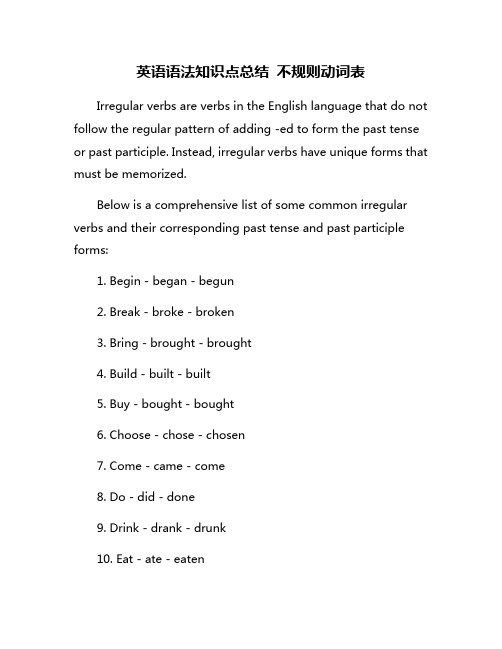
英语语法知识点总结不规则动词表Irregular verbs are verbs in the English language that do not follow the regular pattern of adding -ed to form the past tense or past participle. Instead, irregular verbs have unique forms that must be memorized.Below is a comprehensive list of some common irregular verbs and their corresponding past tense and past participle forms:1. Begin - began - begun2. Break - broke - broken3. Bring - brought - brought4. Build - built - built5. Buy - bought - bought6. Choose - chose - chosen7. Come - came - come8. Do - did - done9. Drink - drank - drunk10. Eat - ate - eaten11. Fall - fell - fallen12. Find - found - found13. Forget - forgot - forgotten14. Get - got - got/gotten15. Go - went - gone16. Have - had - had17. Make - made - made18. Run - ran - run19. See - saw - seen20. Speak - spoke - spokenIt is important to note that irregular verbs do not follow a specific pattern, so they must be memorized individually. Some verbs have the same form for both the past tense and past participle, while others have different forms for each.Understanding and correctly using irregular verbs is essential for mastering the English language. By studying and practicing these verbs, you can improve your fluency and accuracy in both speaking and writing. So, make sure to reviewthe list above and practice using these irregular verbs in sentences to reinforce your knowledge.。
英语语法知识点总结 不规则动词表
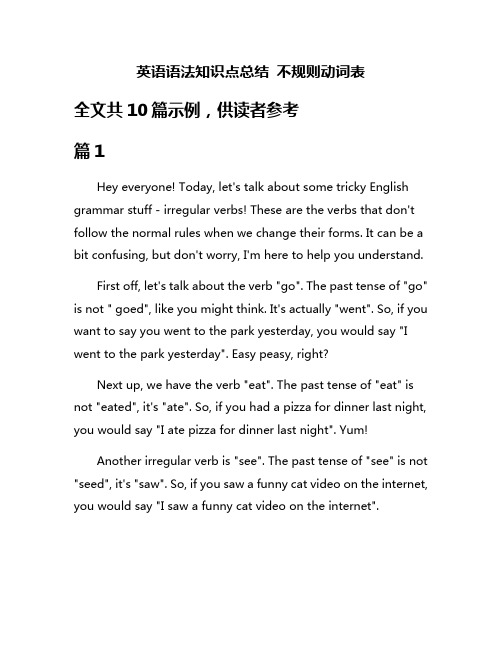
英语语法知识点总结不规则动词表全文共10篇示例,供读者参考篇1Hey everyone! Today, let's talk about some tricky English grammar stuff - irregular verbs! These are the verbs that don't follow the normal rules when we change their forms. It can be a bit confusing, but don't worry, I'm here to help you understand.First off, let's talk about the verb "go". The past tense of "go" is not " goed", like you might think. It's actually "went". So, if you want to say you went to the park yesterday, you would say "I went to the park yesterday". Easy peasy, right?Next up, we have the verb "eat". The past tense of "eat" is not "eated", it's "ate". So, if you had a pizza for dinner last night, you would say "I ate pizza for dinner last night". Yum!Another irregular verb is "see". The past tense of "see" is not "seed", it's "saw". So, if you saw a funny cat video on the internet, you would say "I saw a funny cat video on the internet".One more for you - the verb "buy". The past tense of "buy" is not "buyed", it's "bought". So, if you bought a new toy at the store, you would say "I bought a new toy at the store".There are more irregular verbs out there, so it's important to keep practicing and learning them. But remember, don't stress too much about it! English is a tricky language, but with a little practice, you'll get the hang of it. Keep up the good work, and I'll see you next time!篇2Hey guys! Today I want to talk to you about some irregular verbs in English. These verbs don't follow the normal rules when changing tenses. Let's learn about them together!First up, we have the verb "go". In the present tense, we say "I go to school", but in the past tense, we say "I went to school". See how the past tense form doesn't have "ed" at the end like regular verbs? That's what makes it irregular!Next, let's talk about the verb "eat". In the present tense, we say "I eat pizza", but in the past tense, we say "I ate pizza". Again, there's no "ed" at the end in the past tense form.Another irregular verb is "run". In the present tense, we say "I run in the park", but in the past tense, we say "I ran in the park". The past tense form is different from the present tense form, which is what makes it irregular.There are many other irregular verbs in English, like "see" (present tense) and "saw" (past tense), and "drink" (present tense) and "drank" (past tense). It's important to learn these irregular verbs so you can speak English correctly.I hope you learned something new about irregular verbs today. Remember to practice using them in sentences so you can get better at using them. Keep up the good work, and I'll see you next time!篇3Hey guys! Today let's talk about some irregular verbs in English. These verbs are a little tricky because they don't follow the usual rules for changing in different tenses. But don't worry, I'll explain them in a fun and easy way!1. BeI amYou areHe/She/It is We areThey are2. HaveI haveYou haveHe/She/It has We have They have3. DoI doYou doHe/She/It does We doThey do4. GoI goYou goHe/She/It goes We goThey go5. ComeI comeYou comeHe/She/It comes We comeThey come6. TakeI takeYou takeHe/She/It takes We takeThey take7. EatI eatYou eatHe/She/It eats We eatThey eat8. DrinkI drinkYou drinkHe/She/It drinks We drinkThey drink9. SeeI seeYou seeHe/She/It sees We seeThey see10. GiveI giveYou giveHe/She/It givesWe giveThey giveSo remember, these verbs don't follow the regular pattern when changing in different tenses. Just practice using them in sentences and you'll get the hang of it! Keep up the good work, guys!篇4Hey guys! Today I'm going to talk about some irregular verbs in English. Irregular verbs are verbs that don't follow the regular pattern of adding -ed to make the past tense. They can be a little tricky, but don't worry, I'm here to help you understand them better.1. BeThe verb "be" is one of the most irregular verbs in English. The past tense of "be" is "was" for singular subjects (I, he, she, it)and "were" for plural subjects (you, we, they). For example, "I was happy" or "They were at the park."2. HaveThe past tense of "have" is "had." For example, "She had a great time at the party."3. DoThe past tense of "do" is "did." For example, "I did my homework last night."4. GoThe past tense of "go" is "went." For example, "We went to the beach last summer."5. EatThe past tense of "eat" is "ate." For example, "She ate a sandwich for lunch."6. DrinkThe past tense of "drink" is "drank." For example, "He drank a glass of water."7. ComeThe past tense of "come" is "came." For example, "They came to visit us last weekend."8. SeeThe past tense of "see" is "saw." For example, "I saw a movie yesterday."9. TakeThe past tense of "take" is "took." For example, "She took the bus to school."10. DriveThe past tense of "drive" is "drove." For example, "He drove to the store."Remember, irregular verbs don't follow the regular rules, so it's important to memorize them. Practice using these verbs in sentences to help you remember their past tense forms. Keep practicing, and soon you'll be an expert on irregular verbs!篇5Hey guys, today let's talk about some cool stuff in English grammar – irregular verbs!So, you know how most verbs in English follow a pattern when we change their tense or form them in different ways, right? Well, some verbs are a little bit special and don't follow the rules. These are called irregular verbs, and they can be a bit tricky to remember, but don't worry, I'm here to help!One of the most common irregular verbs is "go". In the present tense, we say "I go to school every day", but in the past tense, it becomes "I went to school yesterday". See how it changes? It doesn't follow the usual "-ed" ending like most verbs do.Another irregular verb is "eat". We say "I eat pizza for lunch", but in the past tense, it changes to "I ate pizza for lunch yesterday". It doesn't add an "-ed" either.There are tons of irregular verbs in English, like "write" (write/wrote/written), "see" (see/saw/seen), and "take"(take/took/taken). It's a good idea to make a list of these verbs and practice using them in sentences so you can remember their different forms.So, next time you come across an irregular verb, don't panic! Just remember that they don't follow the usual rules, and with a little practice, you'll get the hang of using them correctly. Keep up the good work, and you'll be a grammar pro in no time!Hope this helps you guys understand irregular verbs better. Have fun learning English grammar, and remember – practice makes perfect!篇6Hey guys, today I'm gonna talk to you about irregular verbs in English! I know it sounds super boring, but trust me, it's important to know these so you can sound like a pro whenyou're speaking English.So, what are irregular verbs? Well, they are verbs that don't follow the regular rules when you change them into different tenses. For example, most verbs in English add -ed to form the past tense, like "walk" becomes "walked." But irregular verbs have their own special past tense forms that don't follow this rule.Some common irregular verbs include "go" (went), "eat" (ate), "see" (saw), and "have" (had). You just have to memorize these forms because there's no set pattern to follow.But don't worry, I'm gonna give you some tips to help you remember these irregular verbs. First, try to use them in sentences so you get used to how they sound. For example, "Yesterday, I went to the park." Second, make flashcards with thepresent and past tense forms of the verbs to study. And finally, practice, practice, practice!So there you have it, guys! Irregular verbs might seem tricky at first, but with some practice and patience, you'll get the hang of them in no time. Keep studying and soon you'll be an English grammar pro!篇7Title: A Super Fun Summary of Irregular Verbs in English Grammar!Hey there, guys and gals! Today we're going to talk about some super cool stuff called irregular verbs in English. But don't worry, it's not as scary as it sounds! Irregular verbs are just verbs that don't follow the usual rules when we change their forms. Let's dive right in and learn all about them.First up, we have the verb "go." When we talk about the past tense of "go," we don't say "goed" like we usually do with regular verbs. Instead, we say "went." For example, "Yesterday, I went to the park with my friends." Cool, right?Next, let's talk about the verb "eat." In the past tense, we don't say "eated" like we might expect. Nope, we say "ate." So, "Yesterday, I ate a delicious sandwich for lunch." Yum!Now, let's take a look at the verb "catch." The past tense of "catch" is not "catched." It's actually "caught." For example, "Yesterday, I caught a butterfly in the garden." How exciting!Moving on to the verb "have." In the past tense, we don't say "haved." Nope, we say "had." So, "Yesterday, I had a great time at the zoo with my family." Fun times!Last but not least, let's talk about the verb "find." The past tense of "find" is not "finded." It's actually "found." For example, "Yesterday, I found my lost teddy bear under the bed." Phew, crisis averted!And there you have it, folks! A super fun summary of some irregular verbs in English grammar. Remember, irregular verbs may not follow the usual rules, but that's what makes them extra special and interesting. So keep practicing and soon you'll be a pro at using them correctly. Good luck, and keep on learning!篇8Hey guys! Today let's talk about some super cool stuff - irregular verbs! These verbs don't follow the normal rules when we change their past tense or past participle forms. Let's check them out together!First up, we have the verb "go". In the past tense, instead of saying "goed", we say "went". For example, "I went to the park yesterday." Pretty cool, right?Next, let's look at the verb "eat". The past tense of "eat" is not "eated", it's "ate". So, you can say "I ate a delicious pizza for dinner last night."Then, there's the verb "run". The past tense form is not "runned", it's "ran". For instance, "I ran in the race and won a medal."Moving on to the verb "see". The past tense of "see" is "saw", not "seed". So, you can say "I saw a shooting star last night."Now, let's talk about the verb "come". The past tense of "come" is not "comed", it's "came". For example, "She came to my birthday party last weekend."Last but not least, we have the verb "drink". The past tense form is not "drinked", it's "drank". So, you can say "I drank a glass of water after playing soccer."So, remember these irregular verbs and impress your friends with your awesome grammar skills. Keep practicing and you'll master them in no time! Have fun learning, everyone!篇9Hello everyone! Today, I'm going to talk about somenot-so-regular verbs in English. They are called irregular verbs because they don't follow the usual rules when it comes to changing tenses. Let's dive in and learn more about them!First up, we have the verb "go". It's easy to remember the past tense of "go" because it's the same - "went". So, you can say "I go to the park" in the present tense and "I went to the park" in the past tense.Next, let's look at the verb "eat". The past tense of "eat" is "ate", not "eated". So, you would say "I eat a sandwich" in the present tense and "I ate a sandwich" in the past tense.Another tricky one is the verb "see". The past tense of "see" is "saw", not "seed". So, you would say "I see a bird" in the present tense and "I saw a bird" in the past tense.There are many more irregular verbs in English, like "take" (past tense: took), "come" (past tense: came), and "drink" (pasttense: drank). It's important to memorize these irregular verbs because they don't follow the usual patterns.I hope this brief summary of irregular verbs helps you understand how they work in English. Keep practicing and soon you'll be a pro at using them correctly! Thanks for listening!篇10Hey guys! Today I'm going to talk about some super cool English grammar rules - irregular verbs! Yeah, they're not like regular verbs that just add -ed at the end to make past tense. Irregular verbs have their own special past tense forms. Let's check them out!First up, we have the verb "go". In present tense, it's "go", but in past tense, it's "went". Isn't that weird? You don't say "I goed to the park", you say "I went to the park".Next, we have the verb "eat". In present tense, it's "eat", but in past tense, it's "ate". For example, you don't say "I eated a pizza", you say "I ate a pizza".Then there's the verb "see". In present tense, it's "see", but in past tense, it's "saw". So you say "I see a puppy" in present tense, but "I saw a puppy" in past tense.There are lots more irregular verbs, like "give" (present) and "gave" (past), "do" (present) and "did" (past), and "have" (present) and "had" (past).So remember guys, not all verbs follow the same rules in English. Irregular verbs have their own special past tense forms that you just have to memorize. And practice makes perfect, so keep using these verbs in sentences to get the hang of them. Have fun learning English grammar!。
(完整版)IrregularVerbs(不规则动词表)
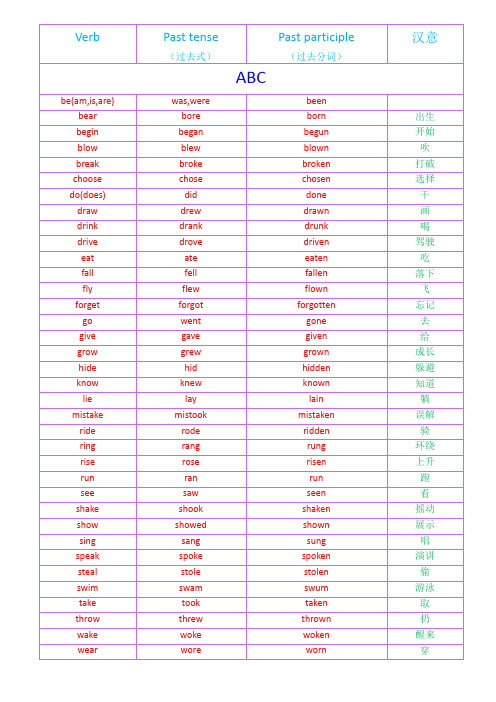
grow
grew
grown
成长
hide
hid
hidden
躲避
know
knew
known
知道
lie
lay
lain
躺
mistake
mistook
mistaken
误解
ride
rode
ridden
骑
ring
rang
rung
环绕
rise
rose
risen
上升
run
ran
run
跑
see
saw
seen
看
shake
shook
shaken
摇动
show
showed
shown
展示
sing
sang
sung
唱
speak
spoke
spoken
演讲
steal
stole
stolen
偷
swim
swam
swum
游泳
take
took
taken
取
throw
threw
thrown
扔
wake
woke
woken
醒来
wear
wore
worn
told
told
告诉
think
thought
thought
想
understand
understood
understood
理解明白
win
won
won
获胜
AAA
cost
cost
cost
英语不规则动词表Irregular verbs(修正重排-带音标和汉语解释)
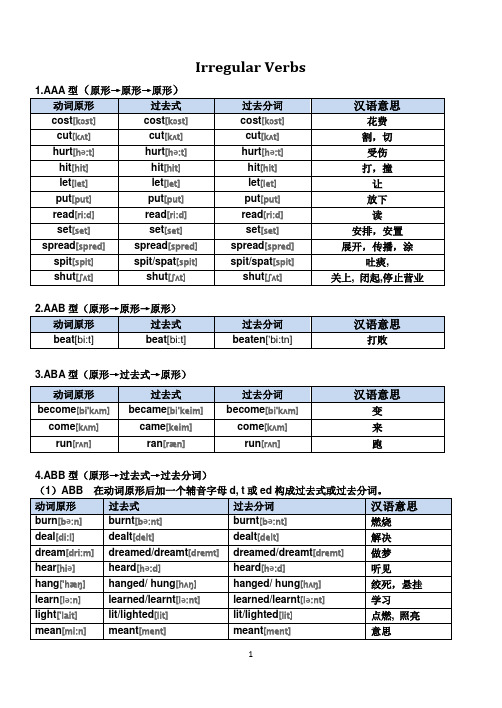
买
fight[fait]
fought[fɔ:t]
fought[fɔ:t]
打架
think[θiŋk]
thought[θɔ:t]
thought[θɔ:t]
思考,想
(4)ABB原形→aught →aught
动词原形
过去式
过去分词
汉语意思
catch[kætʃ]
caught[kɔ:t]
told[təuld]
told[təuld]
告诉
retell[,ri:'tel]
retold[,ri:'təuld]
retold[,ri:'təuld]
重讲,重复,复述
5.ABC(1)原形→过去式→原形+(e)n
动词原形
过去式
过去分词
汉语意思
blow[bləu]
blew[blu:]
blown[bləʊn]
Irregular Verbs
1.AAA型(原形→原形→原形)
动词原形
过去式
过去分词
汉语意思
cost[kɔst]
cost[kɔst]
cost[kɔst]
花费
cut[kʌt]
cut[kʌt]
cut[kʌt]
割,切
hurt[hə:t]
hurt[hə:t]
hurt[hə:t]
受伤
hit[hit]
hit[hit]
found[faʊnd]
found[faʊnd]
发现,找到
get[ɡet]
got[ɡɔt]
got/gotten['ɡɔtən]
得到
hold[həuld]
Irregular Verbs不规则动表
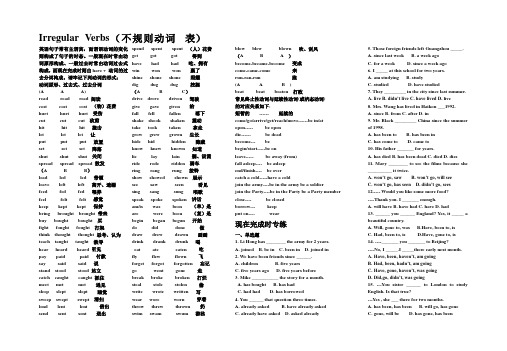
Irregular Verbs(不规则动词表)英语句子常有主谓宾,而谓语动词的变化则构成了句子的时态。
一般现在时常由动词原形构成、一般过去时常由动词过去式构成,而现在完成时则由have + 动词的过去分词构成。
请牢记下列动词的形式:动词原形、过去式、过去分词(A A A)read read read 阅读cost cost cost (物)花费hurt hurt hurt 受伤cut cut cut 砍剪hit hit hit 撞击let let let 让put put put 放置set set set 降落shut shut shut 关闭spread spread spread 散发(A B B)lead led led 带领leave left left 离开、遗漏feed fed fed 喂养feel felt felt 感觉keep kept kept 保持bring brought brought 带来buy bought bought 买fight fought fought 打架think thought thought 思考、认为teach taught taught 教导hear heard heard 听见pay paid paid 付款say said said 说stand stood stood 站立catch caught caught 抓住meet met met 遇见sleep slept slept 睡觉sweep swept swept 清扫lend lent lent 借出send sent sent 送出spend spent spent (人)花费get got got 得到have had had吃、拥有win won won 赢了shine shone shone 照耀dig dug dug 挖掘(A B C)drive drove driven 驾驶give gave given 给fall fell fallen 落下shake shook shaken 震动take took taken 拿走grow grew grown 生长hide hid hidden 隐藏know knew known 知道lie lay lain 躺、说谎ride rode ridden 骑车ring rang rung 按铃show showed shown 展示see saw seen 看见sing sang sung 唱歌speak spoke spoken 讲话am/is was been (单)是are were been (复)是begin began begun 开始do did done 做draw drew drawn 画画drink drank drunk 喝eat ate eaten 吃fly flew flown 飞forget forgot forgotten 忘记go went gone 走break broke broken 打烂steal stole stolen 偷write wrote written 写wear wore worn 穿着throw threw thrown 扔swim swam swum 游泳blow blew blown 吹、刮风(A B A )become-became-become 变成come-came-come 来run-ran-run 跑(A A B )beat beat beaten 打败常见终止性动词与延续性动词(或状态动词)的对应关系如下:短暂的------ 延续的come/go/arrive/get/reach/move------be in/atopen----- be opendie------ be deadbecome--- bebegin/start-----be onleave----- be away (from)fall asleep---- be asleepend/finish---- be overcatch a cold-----have a coldjoin the army----be in the army be a soldierjoin the Party----be in the Party be a Party memberclose---- be closedborrow--- keepput on---- wear现在完成时专练一、单选题1. Li Hong has ________ the army for 2 years.A. joinedB. be inC. been inD. joined in2. W e have been friends since ______.A. childrenB. five yearsC. five years agoD. five years before3. Mike ___________ the story for a month.A. has boughtB. has hadC. had hadD. has borrowed4. Y ou ______ that question three times.A. already askedB. have already askedC. already have askedD. asked already5. Those foreign friends left Guangzhou _____.A. since last weekB. a week agoC. for a weekD. since a week ago6. I _____ at this school for two years.A. am studyingB. studyC. studiedD. have studied7. They _________ in the city since last summer.A. liveB. didn’t liveC. have livedD. live8. Mrs. Wang has lived in Haikou ___1992.A. sinceB. fromC. afterD. in9. Mr. Black _________ China since the summerof 1998.A. has been toB. has been inC. has come toD. came to10. His father _______ for years.A. has diedB. has been deadC. diedD. dies11. Mary ________ to see the films because she__________ it twice.A. won’t go, sawB. won’t go, will seeC. won’t go, has seenD. didn’t go, sees12.---- Would you like some more food?----Thank you. I _______ enough.A. will haveB. have hadC. haveD. had13. ______ you ______ England? Y es, it _____ abeautiful country.A. Will, gone to, wasB.Have, been to, isC. Had, been to, isD.Have, gone to, is14. ----_______ you _______ to Beijing?----No, I _____.I _____there early next month.A. Have, been, haven’t, am goingB. Had, been, hadn’t, am goingC. Have, gone, haven’t, was goingD. Did,go, didn’t, was going15. ---Y ou sister ______ to London to studyEnglish. Is that true?---Y es , she ___ there for two months.A. has been, has beenB. will go, has goneC. gone, will beD. has gone, has been16. He has a computer of his own. He ____ it two days agoA. boughtB. had boughtC. buyD. has bought17. —Where is Li Lei? —He ___ Shanghai.A. has gone toB. has been toC. went toD. goes to18. He _______ his homework and is now listening to music.A..finishesB. has finishedC. finishD. is finishing19. David _______ Shanghai for more than three months.A. came toB. has been toC. has been inD. has come to20. --- Is your father a Party member?--- Y es, he ____ the party three years ago. He _____ a Party member for three years.A. joined; has beenB. has joined; has beenC. was joined; isD. joined; was21. ---What a nice bike! How long ____ you ____ it?----Just five weeks.A. will; buyB. did; buyC. are; havingD. have; had22. I ______ this book for a week .I have to return it now.A. borrowedB. have borrowedC. keptD. have kept23. ----______ your sister _______ in Green China for a long time? ----Y es. She joined it five years ago.A. Has; beenB. Have; beenC. Has; joinedD. Have; joined24. ---How long have you _______ from the USA?----For three months.A. come backB. returnedC. go backD. been back25. I _____ this book for half a year.A. have boughtB. have hadC. boughtD. had26. The students are sorry to hear that famous singer _______ fora year.A. has leftB. has goneC. has been awayD. has gone away27. --- ______ you______ your homework yet?---Y es, I _____ it just now.A. Did; do; finishedB. Have; done; finishedC. Have; done; have finishedD. Will; do; finish28. The sand storm weather ______ in Beijing several times this year.A. happenB. happenedC. has happenedD. have happened29. ---How long have you been here? --- ____ last month.A. ForB. UntilC. BeforeD. Since30. He ____ a cold for three days.A. has caughtB. has hadC. has gotD. caught 31. Jim Green ____ in China for two years.A. has comeB. has beenC. has arrivedD. came32. The film ____ for half an hour.A. has been onB. has begunC. hasn’t begunD. began33.—Where have you _______ these days?—I have to Beijing with my friends.A. been;goneB. been;beenC. gone;beenD. gone;gone34.How long have you _______ this book?A. bought B.borrowed C.had D.lent35. W e have lived here _______ five years ago.A. when B.since C.before D.after36.—I have watched the game.—When _____you _______ it?A.have;watched B.do;watch C.did;watch D.will;watch37.—How do you like Beijing, Mr. Black?—Oh,I _______ such a beautiful city.A.don't visit B.didn't visit C.haven't visited D.hadn't visited38.Miss Brown _______ to the Great Wall twice.A.have been B.has been C.have gone D.has gone39.His brother has been to Stone Forest twice ______ he came toYunnan.A.after B.before C.since D.for40.His grandpa _______ for two years.A.was died B.has been dead C.was dead D.has died41.—Have you ever_______ to Haikou?—Y es,I_______ there with my family last August.A.gone;went B.been;wentC.been;went to D.been;was in42. His sister ______ her hometown for three years. She'll returnnext year.A.left B.has left C.has been away D.has been away from二、句型转换(每空一词)。
